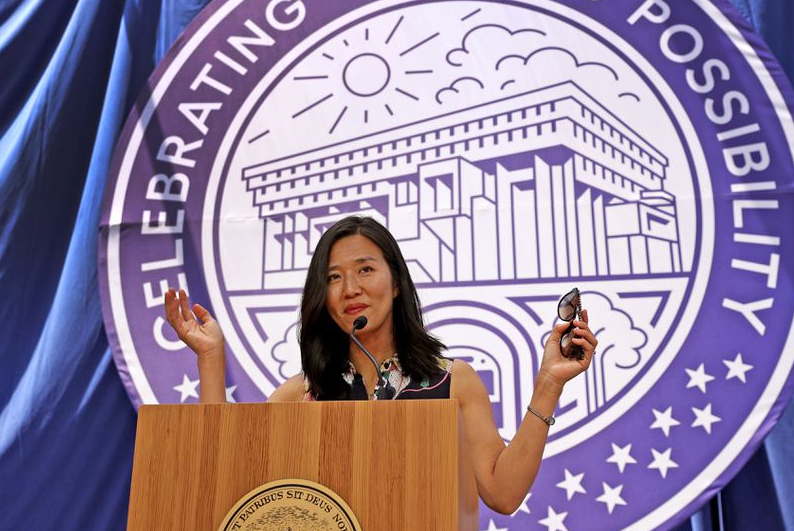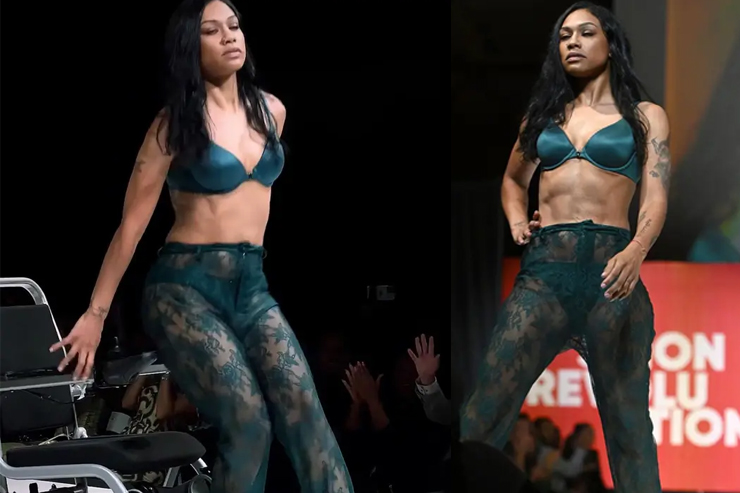In a departure from the usual formal inauguration ceremonies, Boston Mayor Michelle Wu celebrated her first term in office with a lively “block party” at Boston City Hall. The festive event, held outdoors, provided a vibrant and inclusive atmosphere for both residents and city officials.
Originally scheduled seven months earlier, Wu’s inauguration had been postponed due to the omicron surge. However, this delay allowed her to take advantage of the warm summer weather and create a memorable celebration that would resonate with the people of Boston.
The free outdoor gathering featured a live band, a DJ spinning catchy tunes, a soda bar to quench the attendees’ thirst, and tables for arts and crafts activities. Revelers could be seen painting rocks with creative designs and decorating tote bags with colorful patterns. It was a reflection of Mayor Wu’s vision for community engagement and inclusivity.
As the sun bathed the venue in warm, golden hues, attendees of all ages filled the dance floor. From city employees to local residents, and even politicians like Congresswoman Ayanna Pressley, Salem Mayor Kim Driscoll, and Boston City Councilor Kenzie Bok, the event truly brought people together in the spirit of celebration.
Joseph Headley, a city data analyst who stumbled upon the block party during his lunch break, felt the electric energy in the air. He appreciated the festive atmosphere, especially compared to the usual format of long speeches at traditional inaugurations.
“Like OK, you’re doing that,” Headley said, referring to the speeches, “but at the same time, are people really enjoying the time that they’re having?” It was evident that the block party allowed for genuine enjoyment and connection among attendees.
Leah Kihn, a student at Regis College, sat at a picnic table just outside the main tent, taking in the sights and sounds of the celebration. Leah shared a personal perspective on why she chose to attend, stating, “I’m adopted from China, and I’ve never seen an Asian elected” before. She expressed her non-political stance but conveyed her desire to support and witness Asian-American leadership in action.
Mayor Wu briefly interrupted the festivities to deliver a one-minute speech. Standing at the heart of the celebration, she addressed the crowd, saying, “This is what Boston looks like. I just want to pledge once again that the exact same values and ideas and commitment to lifting up the voices in our neighborhoods continue to drive our work every day.” Her words resonated with the diverse crowd, reaffirming her dedication to representing and working for all Bostonians.
The block party celebration was made possible by a $1.1 million inauguration fund, which included contributions from prominent developers, businesses, and lobbying firms in the city. This fund ensured that the celebration could be enjoyed by all attendees without any financial burden. Importantly, the fund clarified in a statement that these donations would not influence Mayor Wu’s governance of City Hall. Transparency and accountability were paramount, assuring the public that the celebration’s funding would not compromise the principles upon which Mayor Wu’s administration was built.
The vibrant and inclusive nature of Mayor Michelle Wu’s inauguration block party reflects a commitment to engaging with the community and embracing diversity. It set a refreshing and optimistic tone for her term in office, resonating with residents who value genuine connections and community-driven leadership.
Michelle Wu’s journey to becoming Boston’s mayor is itself a testament to the changing face of politics in the United States. Born in Chicago to Taiwanese immigrant parents, Wu’s story is emblematic of the American Dream. She earned degrees from Harvard College and Harvard Law School and served as a Peace Corps volunteer in Peru. Wu’s experience, dedication, and vision for a more inclusive Boston have made her a rising star in American politics.
Wu first entered public service as a legal advocate at the WilmerHale Legal Services Center in Jamaica Plain, where she worked to support low-income families. Her commitment to addressing issues of social justice and economic inequality was evident even in these early stages of her career.
In 2013, Michelle Wu ran for a seat on the Boston City Council and won in a landslide victory. Her campaign emphasized a more open and accessible city government, resonating with Bostonians who were eager for change. Wu quickly established herself as a progressive voice on the council, advocating for affordable housing, public transportation, and sustainable urban development.
During her tenure on the Boston City Council, Wu gained a reputation for her innovative ideas and her ability to build coalitions across the aisle. She championed legislation to protect restaurant workers’ rights, improve public education, and combat the climate crisis. Wu’s focus on these critical issues earned her widespread support, and she was reelected to the council in 2015 and 2017.
In 2021, Michelle Wu set her sights on the Boston mayoral race. Running on a platform of bold, progressive change, she engaged voters with her vision for a more equitable and sustainable city. Wu’s message resonated with a broad coalition of supporters, from grassroots activists to business leaders, and she emerged victorious in the mayoral election.
As Boston’s first female mayor and the first person of color to hold the office, Wu’s inauguration was a historic moment. It represented not only a changing of the guard but also a commitment to a more inclusive and forward-looking Boston.
In her inaugural address, Mayor Wu emphasized the importance of community engagement and collaboration. She spoke of her commitment to lifting up the voices of Boston’s neighborhoods, ensuring that every resident has a seat at the table. Wu’s vision for Boston includes affordable housing, improved public transportation, and a sustainable future for all.
The block party celebration served as a tangible expression of Mayor Wu’s commitment to fostering connections and bringing people together. It was a departure from the traditional pomp and circumstance of political inaugurations, opting instead for a joyful and inclusive gathering that celebrated the diversity and vibrancy of Boston.
Mayor Michelle Wu’s leadership represents a new era in Boston politics, one marked by innovation, inclusivity, and a dedication to addressing the pressing issues facing the city. Her inauguration block party was a testament to her vision for a Boston that works for everyone, where all voices are heard, and where community engagement is at the heart of governance.
In the coming years, Bostonians will be watching closely as Mayor Wu works to turn her vision into reality. From affordable housing to climate action, her administration faces significant challenges, but her inauguration celebration demonstrated that she is ready to tackle them with energy, enthusiasm, and a commitment to the people of Boston.





